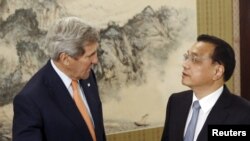During his visit to South Korea Monday, U.S. Secretary of State John Kerry indicated that China is considering supporting new sanctions against North Korea, but analysts are skeptical that Beijing will take any punitive measures that might cause instability on the Korean peninsula.
After meeting with leaders in Beijing and Seoul, the U.S. Secretary of State harshly criticized Pyongyang for its continued pursuit of nuclear weapons and North Korean leader Kim Jong Un personally for allegedly executing a number of high ranking officials, including Defense Minister Hyon Yong Chol, who was allegedly killed with an anti-aircraft gun.
Kerry said Beijing shares Washington’s increasing concerns and frustrations in trying to persuade the Kim Jong Un regime to return to international talks to end its nuclear weapons program. More importantly, he said U.S. and Chinese officials were discussing imposing new sanctions on North Korea. And he implied that Beijing would support a United Nations referendum to refer the Kim Jong Un regime to the International Criminal Court for human rights violations, unless Pyongyang soon changes its behavior.
North Korea and China analyst John Delury with Yonsei University in Seoul said it is likely that Beijing’s leaders share Kerry’s concerns but he doubts they support increasing pressure on the regime.
“It makes me skeptical when we hear American officials speaking on behalf of Beijing, saying China wants to rely more on sanctions or are going to unveil new hard mechanisms against Pyongyang, rather than China themselves saying that,” said Delury.
While China is North Korea’s main trading partner and provides significant food aid, fertilizer and other assistance, there has always been a degree of mistrust in their alliance. Since Kim Jong Un took power in 2011 the relationship has gotten worse.
In contrast to his father Kim Jong Il who made regular visits to China to underscore their close alliance, Kim Jong Un has yet to visit Beijing. And after Pyongyang conducted its third nuclear test in 2013, China joined in supporting some economic sanctions against North Korea.
Korea analyst Nam Kwang-kyu, with the Asiatic Research Institute of Korea University, said that while relations are strained, the two countries have not become adversarial.
He said China is actively opposing North Korea’s nuclear test and supporting U.N. sanctions and these behaviors make North Korea feel uncomfortable with China. But he pointed out North Korea is still an important country for China on military and security issues, so China cannot turn its back on North Korea completely.
The two countries share a 1,400 kilometer border and Beijing is reportedly opposed to taking punitive measures that could cause upheaval or spark mass migration of North Koreans seeking refuge in China.
In the 1990s more than 1 million North Koreans are believed to have died in a famine that was caused in part by mismanagement and neglect by the tightly-controlled state-run communist system. North Korea’s economy is said to be improving due to some economic reforms, but poverty and malnutrition are still commonplace.
The American strategy as outlined by Secretary Kerry in Seoul is to diplomatically isolate the North Korean leadership and increase economic sanctions until Pyongyang takes action to halt or dismantle its nuclear program as a condition for resuming international talks to normalize relations.
Professor Nam said China does not agree with taking such harsh measures, even though China holds a common position on opposing North Korea’s nuclear capability.
Instead, Professor Delury said, Beijing supports lowering the bar of preconditions to resume negotiations.
“They are committed to denuclearization but they don’t think sanctions are going to get us there. They think everyone especially the Americans need to talk to North Korea and along the way they don’t want to destabilize the Korean peninsula,” said Delury.
While China and the U.S. agree on the need to persuade North Korea to end its nuclear ambitions, they remain far apart on measures needed to make that happen.
VOA Seoul Producer Youmi Kim contributed to this report.





